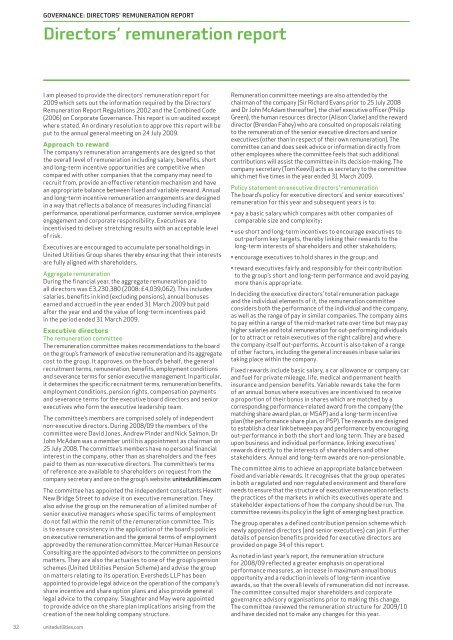Annual report and financial statement 2009 - United Utilities
Annual report and financial statement 2009 - United Utilities
Annual report and financial statement 2009 - United Utilities
You also want an ePaper? Increase the reach of your titles
YUMPU automatically turns print PDFs into web optimized ePapers that Google loves.
GOVERNANCE: DIRECTORS’ REMUNERATION REPORTDirectors’ remuneration <strong>report</strong>I am pleased to provide the directors’ remuneration <strong>report</strong> for<strong>2009</strong> which sets out the information required by the Directors’Remuneration Report Regulations 2002 <strong>and</strong> the Combined Code(2006) on Corporate Governance. This <strong>report</strong> is un-audited exceptwhere stated. An ordinary resolution to approve this <strong>report</strong> will beput to the annual general meeting on 24 July <strong>2009</strong>.Approach to rewardThe company’s remuneration arrangements are designed so thatthe overall level of remuneration including salary, benefits, short<strong>and</strong> long-term incentive opportunities are competitive whencompared with other companies that the company may need torecruit from, provide an effective retention mechanism <strong>and</strong> havean appropriate balance between fixed <strong>and</strong> variable reward. <strong>Annual</strong><strong>and</strong> long-term incentive remuneration arrangements are designedin a way that reflects a balance of measures including <strong>financial</strong>performance, operational performance, customer service, employeeengagement <strong>and</strong> corporate responsibility. Executives areincentivised to deliver stretching results with an acceptable levelof risk.Executives are encouraged to accumulate personal holdings in<strong>United</strong> <strong>Utilities</strong> Group shares thereby ensuring that their interestsare fully aligned with shareholders.Aggregate remunerationDuring the <strong>financial</strong> year, the aggregate remuneration paid toall directors was £3,230,380 (2008: £4,039,062). This includessalaries, benefits in kind (excluding pensions), annual bonusesearned <strong>and</strong> accrued in the year ended 31 March <strong>2009</strong> but paidafter the year end <strong>and</strong> the value of long-term incentives paidin the period ended 31 March <strong>2009</strong>.Executive directorsThe remuneration committeeThe remuneration committee makes recommendations to the boardon the group’s framework of executive remuneration <strong>and</strong> its aggregatecost to the group. It approves, on the board’s behalf, the generalrecruitment terms, remuneration, benefits, employment conditions<strong>and</strong> severance terms for senior executive management. In particular,it determines the specific recruitment terms, remuneration benefits,employment conditions, pension rights, compensation payments<strong>and</strong> severance terms for the executive board directors <strong>and</strong> seniorexecutives who form the executive leadership team.The committee’s members are comprised solely of independentnon-executive directors. During 2008/09 the members of thecommittee were David Jones, Andrew Pinder <strong>and</strong> Nick Salmon. DrJohn McAdam was a member until his appointment as chairman on25 July 2008. The committee’s members have no personal <strong>financial</strong>interest in the company, other than as shareholders <strong>and</strong> the feespaid to them as non-executive directors. The committee’s termsof reference are available to shareholders on request from thecompany secretary <strong>and</strong> are on the group’s website: unitedutilities.comThe committee has appointed the independent consultants HewittNew Bridge Street to advise it on executive remuneration. Theyalso advise the group on the remuneration of a limited number ofsenior executive managers whose specific terms of employmentdo not fall within the remit of the remuneration committee. Thisis to ensure consistency in the application of the board’s policieson executive remuneration <strong>and</strong> the general terms of employmentapproved by the remuneration committee. Mercer Human ResourceConsulting are the appointed advisors to the committee on pensionsmatters. They are also the actuaries to one of the group’s pensionschemes (<strong>United</strong> <strong>Utilities</strong> Pension Scheme) <strong>and</strong> advise the groupon matters relating to its operation. Eversheds LLP has beenappointed to provide legal advice on the operation of the company’sshare incentive <strong>and</strong> share option plans <strong>and</strong> also provide generallegal advice to the company. Slaughter <strong>and</strong> May were appointedto provide advice on the share plan implications arising from thecreation of the new holding company structure.Remuneration committee meetings are also attended by thechairman of the company (Sir Richard Evans prior to 25 July 2008<strong>and</strong> Dr John McAdam thereafter), the chief executive officer (PhilipGreen), the human resources director (Alison Clarke) <strong>and</strong> the rewarddirector (Brendan Fahey) who are consulted on proposals relatingto the remuneration of the senior executive directors <strong>and</strong> seniorexecutives (other than in respect of their own remuneration). Thecommittee can <strong>and</strong> does seek advice or information directly fromother employees where the committee feels that such additionalcontributions will assist the committee in its decision-making. Thecompany secretary (Tom Keevil) acts as secretary to the committeewhich met five times in the year ended 31 March <strong>2009</strong>.Policy <strong>statement</strong> on executive directors’ remunerationThe board’s policy for executive directors’ <strong>and</strong> senior executives’remuneration for this year <strong>and</strong> subsequent years is to:• pay a basic salary which compares with other companies ofcomparable size <strong>and</strong> complexity;• use short <strong>and</strong> long-term incentives to encourage executives toout-perform key targets, thereby linking their rewards to thelong-term interests of shareholders <strong>and</strong> other stakeholders;• encourage executives to hold shares in the group; <strong>and</strong>• reward executives fairly <strong>and</strong> responsibly for their contributionto the group’s short <strong>and</strong> long-term performance <strong>and</strong> avoid payingmore than is appropriate.In deciding the executive directors’ total remuneration package<strong>and</strong> the individual elements of it, the remuneration committeeconsiders both the performance of the individual <strong>and</strong> the company,as well as the range of pay in similar companies. The company aimsto pay within a range of the mid-market rate over time but may payhigher salaries <strong>and</strong> total remuneration for out-performing individuals(or to attract or retain executives of the right calibre) <strong>and</strong> wherethe company itself out-performs. Account is also taken of a rangeof other factors, including the general increases in base salariestaking place within the company.Fixed rewards include basic salary, a car allowance or company car<strong>and</strong> fuel for private mileage, life, medical <strong>and</strong> permanent healthinsurance <strong>and</strong> pension benefits. Variable rewards take the formof an annual bonus where executives are incentivised to receivea proportion of their bonus in shares which are matched by acorresponding performance-related award from the company (thematching share award plan, or MSAP) <strong>and</strong> a long-term incentiveplan (the performance share plan, or PSP). The rewards are designedto establish a clear link between pay <strong>and</strong> performance by encouragingout-performance in both the short <strong>and</strong> long term. They are basedupon business <strong>and</strong> individual performance, linking executives’rewards directly to the interests of shareholders <strong>and</strong> otherstakeholders. <strong>Annual</strong> <strong>and</strong> long-term awards are non-pensionable.The committee aims to achieve an appropriate balance betweenfixed <strong>and</strong> variable rewards. It recognises that the group operatesin both a regulated <strong>and</strong> non-regulated environment <strong>and</strong> thereforeneeds to ensure that the structure of executive remuneration reflectsthe practices of the markets in which its executives operate <strong>and</strong>stakeholder expectations of how the company should be run. Thecommittee reviews its policy in the light of emerging best practice.The group operates a defined contribution pension scheme whichnewly appointed directors (<strong>and</strong> senior executives) can join. Furtherdetails of pension benefits provided for executive directors areprovided on page 34 of this <strong>report</strong>.As noted in last year’s <strong>report</strong>, the remuneration structurefor 2008/09 reflected a greater emphasis on operationalperformance measures, an increase in maximum annual bonusopportunity <strong>and</strong> a reduction in levels of long-term incentiveawards, so that the overall levels of remuneration did not increase.The committee consulted major shareholders <strong>and</strong> corporategovernance advisory organisations prior to making this change.The committee reviewed the remuneration structure for <strong>2009</strong>/10<strong>and</strong> have decided not to make any changes for this year.32 unitedutilities.com
















